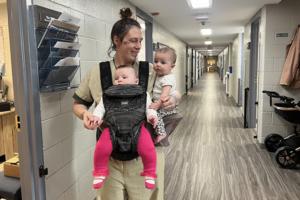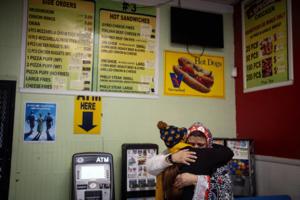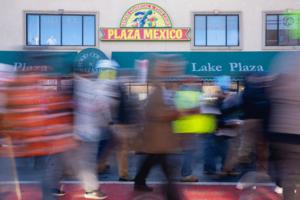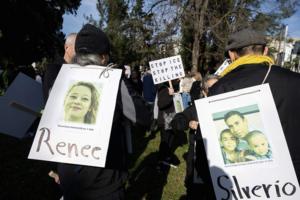Current News
/ArcaMax

Worried about surveillance, states enact privacy laws and restrict license plate readers
As part of its deportation efforts, the Trump administration has ordered states to hand over personal data from voter rolls, driver’s license records and programs such as Medicaid and food stamps.
At the same time, the administration is trying to consolidate the bits of personal data held across federal agencies, creating a single trove of ...Read more

'We just want our lives back.' Maduro's gone, but what's next for 8 million Venezuelans who fled?
MEXICO CITY — Andrea Paola Hernández has one sister in Ecuador and another in London. She has cousins in Colombia, Chile, Argentina and the United States.
All fled poverty and political repression in Venezuela. Hernández, a human rights activist and outspoken critic of the country's authoritarian leader, Nicolás Maduro, eventually left, ...Read more

'Teaching us how to grow with our babies': How prisons allow mothers and infants to nest for months
VANDALIA, Mo. — Kathy Briggs slipped her arms through the thick straps of a brand-new baby carrier, tugging it over her beige shirt as two other women stood beside her, tightening buckles and adjusting the padded waistband.
The carrier was still stiff from its packaging, and Briggs shifted her feet as one of the women gently lifted then-6-...Read more

Top contenders emerge as Thailand heads to polls next month
Thailand is gearing up for a general election Feb. 8, which could usher in the fourth prime minister in three years. The snap vote is expected to produce a coalition government, heightening the risk of continued political instability.
Political upheaval has become the norm over the last two decades. A series of short-lived administrations have...Read more

Illinois family piecing life and restaurant back together after father deported to Pakistan
CHICAGO — In Chicago’s Humboldt Park neighborhood on the city’s West Side, a sandwich shop on North Avenue stands as it has for more than 20 years — menu prices taped over and over again on the wall, a door that squeaks and sticks in its groove, a bulletproof service window separating servers slinging Philly subs with a pile of fries and...Read more

As President Donald Trump targets Colorado, its Democrats -- and some Republicans -- struggle to play defense
DENVER — President Donald Trump’s ongoing pressure campaign against Colorado has left the state’s mostly Democratic leaders on the back foot as they’ve tried to fend off threats to nearly $1 billion in federal funding, financing for a drinking water pipeline, the future of a celebrated research center and more over the past month alone. ...Read more

LA County moves to carve out 'ICE-free' zones following immigration raid violence
After escalating incidents of violence involving federal agents taking part in the Trump administration's immigration crackdown, officials are looking to create "ICE-free" zones in L.A. County.
The Los Angeles County Board of Supervisors voted unanimously on Tuesday to bar immigration enforcement officers from county-owned spaces.
Lindsay ...Read more

How Idaho's transgender sports law was dissected at the U.S. Supreme Court
The U.S. Supreme Court on Tuesday heard arguments in a case challenging an Idaho law that bars transgender women and girls from participating in sports that align with their gender identity.
The case began in 2020, when Idaho became the first state in the nation to pass such a sweeping law targeting trans athletes. Shortly after Gov. Brad ...Read more

Venezuela to send envoy for US talks on same day Machado visits
Venezuela’s acting president plans to send an envoy to Washington to meet with senior U.S. officials on the same day that opposition leader Maria Corina Machado will be in town for her own talks in the wake of Nicolas Maduro’s ouster.
Ambassador Felix Plasencia, the chief of mission at Venezuela’s embassy in the U.K. and a former foreign ...Read more

Dark fleet seeking Russian protection as US seizes oil tankers
The dark fleet of tankers shipping illicit oil around the world is rushing to seek the perceived protection of the Russian flag after the U.S. started seizing vessels involved in the Venezuelan trade.
At least 26 ships have switched registration to Russia since the beginning of last month, with the bulk of those happening after the U.S. ...Read more

Despite controversy and grand jury probe, DeSantis touts Hope Florida as success
Gov. Ron DeSantis on Tuesday went out of his way during his final State of the State speech to the Florida Legislature to tout his wife’s signature initiative, Hope Florida, despite a year of controversy about the program and its related charity.
In a speech that boasted of his last seven years of accomplishments, DeSantis singled out the ...Read more

Obamacare enrollment drops before deadline after subsidies expire
WASHINGTON — About 1.4 million fewer people have signed up for Obamacare plans so far compared to last year as a federal tax credit expires and consumers confront significantly higher premiums.
While the dropoff is less severe than projections by the nonpartisan Congressional Budget Office and others, experts warn more attrition is likely in...Read more

WA flooding left at least $40M in road damage, says early estimate
The damage from December's storms and flooding will cost between $40 million and $50 million, Washington transportation officials say.
The estimate, which has yet to be finalized, came Monday, on day one of the legislative session, minutes into the first House Transportation Committee meeting.
The legislators heard from John Himmel, the ...Read more

Kiefer Sutherland arrested after allegedly assaulting ride-share driver in Hollywood
LOS ANGELES — Actor Kiefer Sutherland was arrested early Monday after police said he assaulted a ride-share driver in Hollywood.
Sutherland was arrested on suspicion of criminal threats after officers responded to reports of an assault on a driver in Hollywood in the early hours of Monday.
The “24” and “Stand by Me” actor, 59, was ...Read more
Former Navy SEAL convicted of trying to bring explosives to San Diego 'No Kings' protests
A former Navy SEAL was convicted Monday of leaving Texas with the intent of throwing explosives at law enforcement officers during the summer’s “No Kings Day” protests in San Diego, federal investigators said.
Gregory Vandenberg stopped at a New Mexico travel center on his way to the local protests and told the cashier he was buying ...Read more

NC faces 'short runway' to fund Medicaid work requirements, health officials say
The federal spending bill passed by Congress last July known as the One Big Beautiful Bill is set to reshape Medicaid, which provides health coverage to more than 3 million North Carolinians.
State Health and Human Services officials told state lawmakers Tuesday that one of the most urgent questions is how to pay for the new work requirements ...Read more
News briefs
Trump says he’ll end sanctuary city payments by month’s end
WASHINGTON— President Donald Trump said he would cut off federal funding to so-called sanctuary cities at the end of the month in the latest escalation over immigration policy with Democratic jurisdictions.
Trump said his administration had also given “90-day notices” to ...Read more

Appeals court rules 'Fat Leonard' must serve full sentence in Navy corruption scandal
SAN DIEGO — Leonard Glenn Francis, the Malaysian contractor known as “Fat Leonard” at the center of the worst bribery and corruption scheme in U.S. Navy history, must serve the remainder of his 15-year prison sentence, according to an appeals court ruling that became official Monday.
The 61-year-old Francis, who pleaded guilty in San ...Read more

Immigrant corridors in both Minneapolis and St. Paul nearly shut down by intensifying ICE actions
Roughly 80% of immigrant owned businesses along key corridors in Minneapolis and St. Paul have closed in the past week as employees and customers stay home in fear of ICE agents detaining them.
Both Latino Economic Development Center on the east side of St. Paul and the Lake Street Business Council both said businesses have lost at least half ...Read more

New California proposal would make it easier to sue ICE agents
California lawmakers Tuesday moved forward a bill that would allow residents to sue federal officials in state courts for constitutional violations.
Although it was first proposed in November, the bill came up for a hearing amid nationwide protests following the shooting death of an unarmed motorist in Minneapolis by an Immigration and Customs ...Read more
Popular Stories
- House panel to seek contempt of Congress against Bill Clinton
- Supreme Court likely to uphold state bans on trans athletes competing on girls' sports teams
- Yosemite's famous 'firefall' won't require reservations in 2026. What to know
- New LAFD chief won't look into who watered down Palisades fire report
- Supreme Court hears case on state bans of trans women in sports





